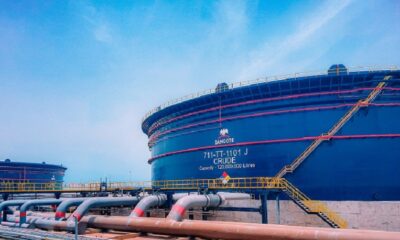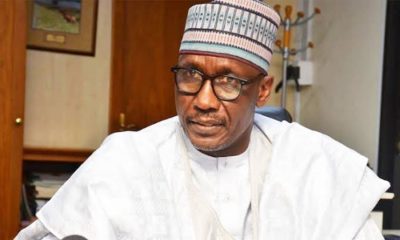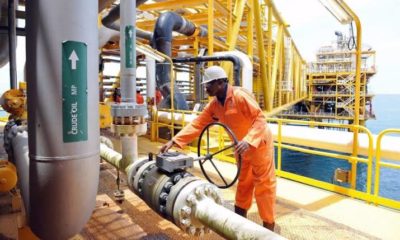Oil
Why Oil Prices May Shoot Back Up

 Price forecasts from the Organization of Petroleum Exporting Countries have never been particularly reliable, so it’s easy do dismiss the latest one — a “constant nominal price” of $110 per barrel of crude oil until the end of this decade, and $177 by 2040. It is, however, worth listening to OPEC secretary general Abdalla El-Badri when he says speculators played a major role in oil’s recent spectacular slump, and prices may rise again next year.
Price forecasts from the Organization of Petroleum Exporting Countries have never been particularly reliable, so it’s easy do dismiss the latest one — a “constant nominal price” of $110 per barrel of crude oil until the end of this decade, and $177 by 2040. It is, however, worth listening to OPEC secretary general Abdalla El-Badri when he says speculators played a major role in oil’s recent spectacular slump, and prices may rise again next year.
OPEC has been publishing its World Oil Outlook since 2007. That first report assumed $50-$60 per barrel of OPEC oil until 2030. Then prices rocketed to $141 and dropped to $33 in 2008, as the global financial crisis developed. In 2010, OPEC predicted a price level of $70-$80 until 2020, but that forecast has been blown out of the water. In the last four years, the average price has been above $100.
As Vagit Alekperov, the founder of the Russian oil giant Lukoil, once remarked, “The price is from God.” Too many factors affect supply and demand for the most ambitious analyst to build a reliable model. OPEC tries, though, and according to its reference scenario, world oil demand will keep rising by at least 1 million barrels per day throughout 2019. Next year, demand outside the world’s most developed countries — members of the Organization for Economic Cooperation and Development — should for the first time outstrip that in the OECD.
The assumption underlying this scenario is that even though the developed world is using more sustainable energy and cars that guzzle less gas, emerging economies’ thirst for oil will grow faster than the developed ones’ will abate. While OPEC expects average oil use per car or truck to decline by 2.2 percent per year, the increase in vehicle fleets in China, India and other emerging markets — more than 1 billion additional cars by 2040 — should more than compensate.
To meet the increased demand, oil companies need to maintain a high level of investment. The organization predicts that its members will invest $40 billion a year until the end of the decade, while non-members will plow $300 billion a year in maintaining and expanding production.
“The situation of low prices cannot continue because if it continues, most of the investments will be stopped,” El-Badri said today. At first glance, that statement suggests the OPEC secretary general is confusing cause with effect. After all, the oil price is supposed to be falling because of slower economic growth and shrinking investment. The World Oil Outlook stresses that “economic growth is not only a key driver of oil demand, but it is also a major source of uncertainty of the required volumes to be invested.”
I wouldn’t dismiss El-Badri’s argument as misguided, however. Oil demand is rather stable. OPEC’s base scenario is based on average global economic growth of 3.5 percent a year between 2014 and 2040. Revising it down to 3.1 percent a year only reduces 2015 demand by 300,000 barrels of crude per day, and 2020 demand by 2 million barrels per day, to 95 million barrels.
Supply, by contrast, is more volatile, and not just because it’s more subject to geopolitical shocks. It’s easy to imagine how underinvestment might cause a disproportionally steep drop in supply. Much of the predicted output growth depends on the success of capital-intensive projects: tight oil, deep-sea drilling, extraction from oil sands. If these are shelved, even with low economic growth, oil will become scarce and prices will rise.
The problem with investment decisions is that they are made by humans, who tend to live in the present. An executive’s gut feeling in reaction to another news story predicting a long-term oil slump may not be entirely rational, but it will affect supply. And, as El-Badri points out, oil prices move because of speculation, as well as supply and demand factors. The OPEC secretary general says demand outstripping supply by 600,000 barrels per day, as it does now, does not justify a 28 percent price drop since mid-June.
El-Badri refuses to conjecture why speculators might want to drive the oil price down. That takes someone less careful, such as Russian President Vladimir Putin, who complained today that the disconnect between the physical oil market and futures trading “creates the conditions for speculative activity and, as a consequence, for price manipulation in somebody’s interests.” According to Putin, “at certain critical moments one gets the impression that politics prevails in forming the prices of energy resources.”
Putin, whose political support is threatened by a rapid ruble devaluation set off by lower oil prices, sees Western plots against him everywhere. One doesn’t, however, need to subscribe to his conspiracy theories to realize that, in financial markets, the power of narratives is great. Now that it’s conventional wisdom, for one reason or another, to be pessimistic on oil, unnecessary investment cuts become more likely, laying the foundation for future price growth.
Oil
NNPC Targets 60% Methane Emission Reduction By 2031
The Nigerian National Petroleum Company Limited (NNPC) has unveiled a bold strategy to reduce methane emissions in the oil and gas sector by 60% by 2031, with an ultimate goal of achieving net-zero emissions by 2060.
This announcement reinforces Nigeria’s leadership role under the Global Methane Pledge initiative and its commitment to tackling climate change.
The Group Chief Executive Officer of NNPC, Mele Kyari, disclosed these plans during a meeting on Thursday with Robert Leahman, the U.S. State Department’s Global Methane Program Manager, and a delegation from Deloitte.
READ MORE: Atiku Gloats Over AUN’s Achievements Ahead Of 20th Anniversary
The discussions, held at the NNPC Towers in Abuja, focused on collaborative efforts to reduce methane emissions through innovative and sustainable practices.
“Reducing methane emissions is not just an environmental necessity but also a strategic imperative for Nigeria’s energy transition. We are leveraging partnerships to adopt global best practices and innovative solutions,” Kyari stated.
Key among these efforts is a pilot project in the Niger Delta, aimed at establishing emissions baselines, mitigating methane leaks, and promoting sustainable operations across Nigeria’s energy sector.
The project, a partnership between NNPC, Deloitte, and the U.S. Bureau of Energy Resources, will utilize data-driven methodologies to pinpoint and address methane hotspots.
Robert Leahman commended Nigeria’s proactive stance, describing it as a benchmark for other nations on the continent.
“Nigeria’s leadership under the Global Methane Pledge sets a standard for the continent. These initiatives will not only help reduce emissions but also drive sustainable development in the energy sector,” he said.
Kyari highlighted the broader benefits of addressing methane emissions, noting its significance for both environmental protection and economic efficiency.
“This collaboration is a game-changer. By addressing methane leaks, we’re reducing waste, saving costs, and protecting the environment. It’s a win-win for our economy and the planet,” he added.
Oil
FG Introduces New Incentives To Revitalize Nigeria’s Oil & Gas Industry
In a strategic move to revitalize Nigeria’s oil and gas sector, the Federal Government has unveiled two key fiscal incentives aimed at attracting investment and enhancing energy security.
The announcement was made by Mr. Wale Edun, the Minister of Finance and Coordinating Minister of the Economy on Wednesday.
The first initiative, the Value Added Tax (VAT) Modification Order 2024, introduces critical exemptions for essential energy products and infrastructure, including Diesel, Feed Gas, Liquefied Petroleum Gas (LPG), Compressed Natural Gas (CNG), Electric Vehicles, Liquefied Natural Gas (LNG) infrastructure, and Clean Cooking Equipment.
Read Also: Atiku Calls For Rotational Presidency Across Nigeria’s Geopolitical Zones
These exemptions are designed to reduce living costs for Nigerians, promote energy security, and accelerate the transition to cleaner energy alternatives.
The second initiative, the Notice of Tax Incentives for Deep Offshore Oil & Gas Production, offers new tax relief options for deep offshore exploration projects.
This measure aims to position Nigeria’s deep offshore basin as a premier destination for international oil and gas investments, boosting the country’s appeal to foreign investors.
These reforms are part of a broader set of policy initiatives, known as Policy Directives 40-42, endorsed by President Bola Ahmed Tinubu.
The directives reflect the administration’s commitment to fostering sustainable development in the energy sector and enhancing Nigeria’s competitive edge in the global oil and gas market.
Business
Tinubu set to approve ExxonMobil-Seplat oil deal, expands CNG bus initiative

By Yemie Adeoye
NIGERIA’s President Bola Tinubu has announced that the protracted ExxonMobil-Seplat upstream oil divestment will be formally approved by the Minister of petroleum within a matter of days, just as he announced his government’s intention to expand the Compress natural Gas, CNG buses initiative.
The President who stated this during his Independence day nationwide broadcast stated that the move is in line with his administration’s commitment to free enterprise, free entry and free exit in investments which is the hallmark of his administration investment policy.
“Fellow compatriots, our administration is committed to free enterprise, free entry, and free exit in investments while maintaining the sanctity and efficacy of our regulatory processes. This principle guides the divestment transactions in our upstream petroleum sector, where we are committed to changing the fortune positively. As such, the ExxonMobil Seplat divestment will receive ministerial approval in a matter of days, having been concluded by the regulator, NUPRC, in line with the Petroleum Industry Act, PIA. This was done in the same manner as other qualified divestments approved in the sector.”
The President also seized the opportunity to plead with Nigerians to be patient with his administration’s reform policies. “As your President, I assure you that we are committed to finding sustainable solutions to alleviate the suffering of our citizens. Once again, I plead for your patience as the reforms we are implementing show positive signs, and we are beginning to see light at the end of the tunnel”.
“Our energy transition programme is on course. We are expanding the adoption of the Presidential Initiative on Compressed Natural Gas for mass transit with private sector players. The Federal Government is ready to assist the thirty-six States and FCT in acquiring CNG buses for cheaper public transportation.
Fellow Nigerians, while we are working to stabilise the economy and secure the country, we also seek to foster national unity and build social harmony and cohesion. Our economy can only thrive when there is peace”. he enthused.

























